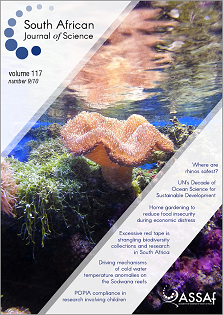Quantifying economic activity in the informal recycling sector in South Africa
DOI:
https://doi.org/10.17159/sajs.2021/8921Keywords:
informal waste reclaimers, earnings, recycling, Extended Producer ResponsibilityAbstract
Informal waste reclaimers are a key part of South Africa’s recycling economy, being responsible for around 51% of all paper and packaging waste collected in South Africa in 2017. Active in the waste and recycling landscape for more than three decades, their activity predates the earliest voluntary paper and packaging Extended Producer Responsibility schemes. However, these voluntary schemes have been instrumental in scaling South Africa’s recycling economy. Investment by brand owners, retailers, converters and recyclers has helped develop local end-use markets, creating a demand for paper and packaging recyclables and a resultant increase in their collection. An analysis of tonnage and price data shows that the mean estimate of money paid by the private sector to the informal waste sector through the purchase of recyclables at intermediaries such as buy-back centres, was ZAR625 million in 2012, increasing to ZAR872 million in 2017. This private sector ‘investment’ in the local recycling economy has led to direct and indirect job creation and improved livelihoods, particularly for a large, well-established and effective informal waste sector, and has indirectly funded municipal waste diversion strategies, saving municipalities in both the collection and disposal of waste.
Significance:
- Informal waste reclaimers make a significant contribution to the diversion of paper and packaging recyclables from landfill to recycling in South Africa.
- Limited information exists on the earnings of informal reclaimers.
- This paper provides new insights on the annual financial payments made by the private sector to informal reclaimers for the collection of recyclables.
Published
Issue
Section
License

This work is licensed under a Creative Commons Attribution 4.0 International License.

All articles are published under a Creative Commons Attribution 4.0 International Licence
Copyright is retained by the authors. Readers are welcome to reproduce, share and adapt the content without permission provided the source is attributed.
Disclaimer: The publisher and editors accept no responsibility for statements made by the authors
How to Cite
- Abstract 1630
- PDF 1375
- EPUB 177
- XML 162












.png)